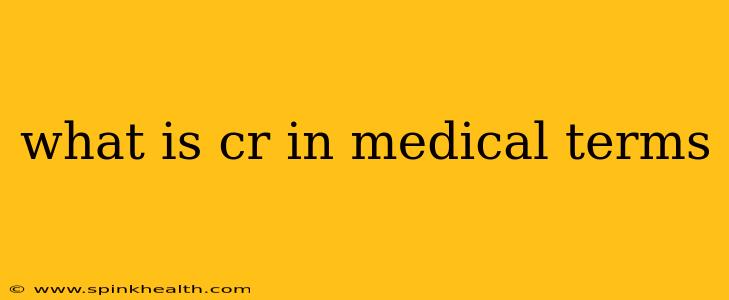What is CR in Medical Terms? A Journey Through Medical Abbreviations
The medical world is a labyrinth of abbreviations, and "CR" is no exception. It doesn't stand for one single thing; its meaning depends entirely on the context. Imagine a medical detective trying to decipher a case – the clues (letters) only reveal the truth when placed within the larger picture (the patient's chart, the discussion among doctors). This is precisely the situation with "CR." Let's explore some of its common meanings.
What does CR stand for in cancer treatment?
Perhaps the most frequent use of "CR" in medical contexts is in oncology. Here, CR stands for Complete Remission. This is a thrilling milestone in the cancer journey. It means that after treatment (chemotherapy, radiation, surgery, or a combination), there's no detectable evidence of cancer in the body. Think of it like this: the cancer cells have been successfully vanquished, at least for now. However, it's crucial to remember that even with a complete remission, regular monitoring is vital, as cancer can sometimes return.
Does CR mean something else in cardiology?
Moving to the heart, "CR" can signify Cardiac Rehabilitation. This is a structured program designed to help patients recover after a heart attack, heart surgery, or other cardiac events. Cardiac rehabilitation typically involves exercise training, education on lifestyle changes (diet, stress management), and counseling. It's a path towards regaining strength and improving overall heart health. The focus is on prevention and reducing the risk of future cardiac issues.
What about CR in other medical specialties?
"CR" might pop up in other specialties, albeit less frequently. It could represent abbreviations specific to a particular hospital or clinic, a shorthand used within a specific research project, or a less commonly used term altogether. For accurate interpretation, you need the complete context. For example, in a patient's record, you might find that CR signifies a specific type of medication, test, or treatment only used locally.
What are some related medical terms?
Understanding "CR" often requires familiarity with related concepts. In cancer treatment, for instance, you might encounter terms like:
- Partial Remission (PR): A significant decrease in the size or extent of the cancer, but not a complete disappearance.
- Progressive Disease (PD): The cancer is worsening despite treatment.
- Stable Disease (SD): The cancer is neither shrinking nor growing significantly.
These terms, along with CR, provide a clearer picture of a patient's response to cancer treatment. Similarly, in cardiology, understanding concepts such as heart failure, angina, and coronary artery disease gives more context to any mention of CR (Cardiac Rehabilitation).
How can I be certain of what CR means in a specific medical document?
Never guess. If you encounter "CR" in a medical report, and you are not a medical professional, contact the doctor or healthcare provider who authored the report for clarification. The precise meaning of "CR" is heavily reliant on context, and misinterpretation can lead to serious consequences.
This journey through the possible meanings of "CR" in medical terms underscores the importance of precise communication in healthcare and the need for always seeking clarification when unsure. The human body is complex, and medical abbreviations, while helpful for brevity, require careful interpretation to ensure patient safety and accurate understanding.

